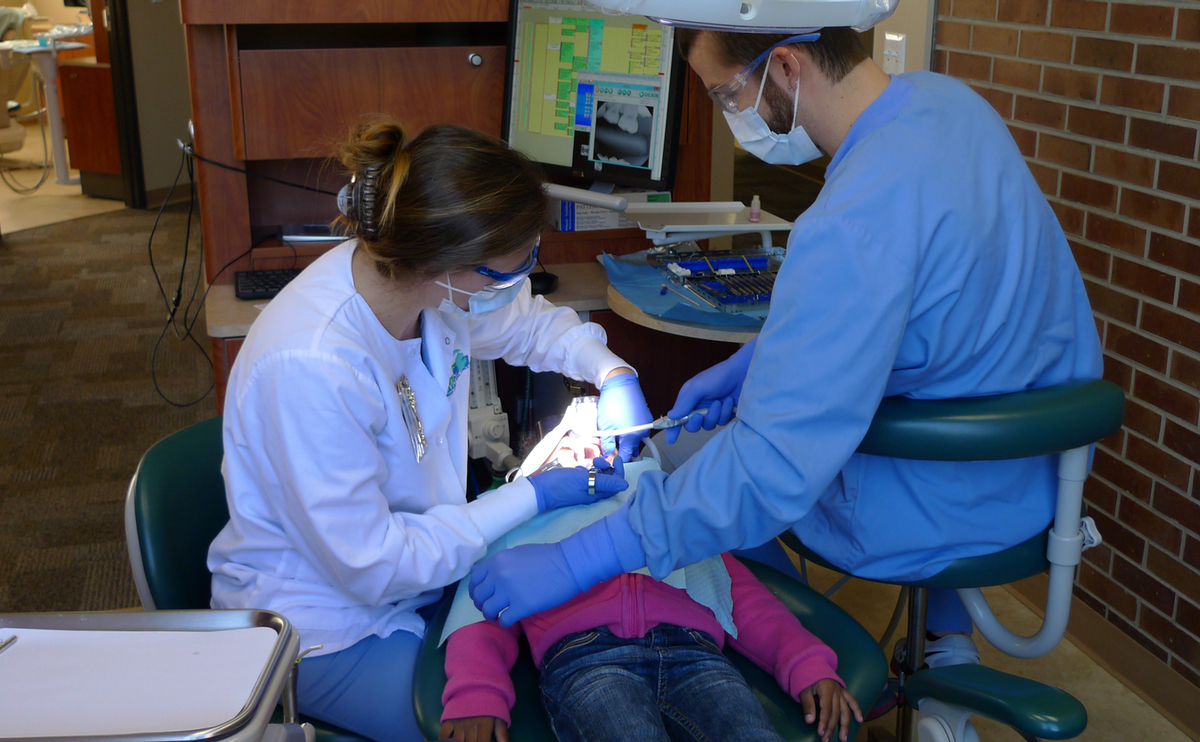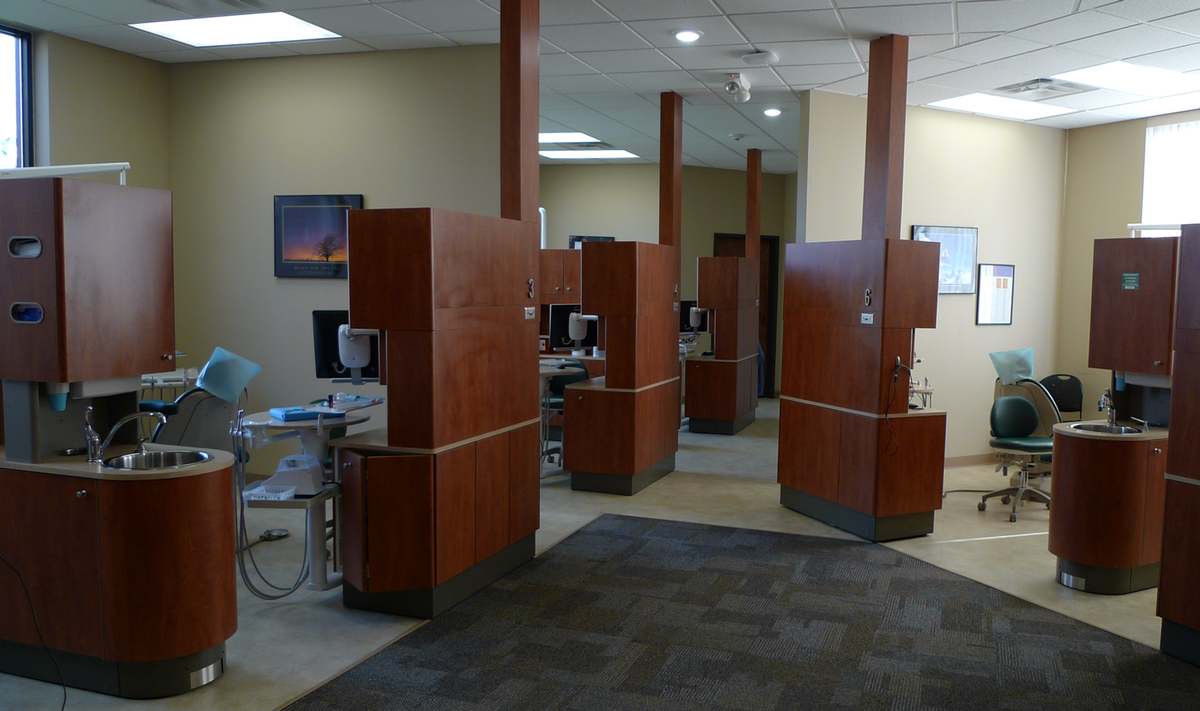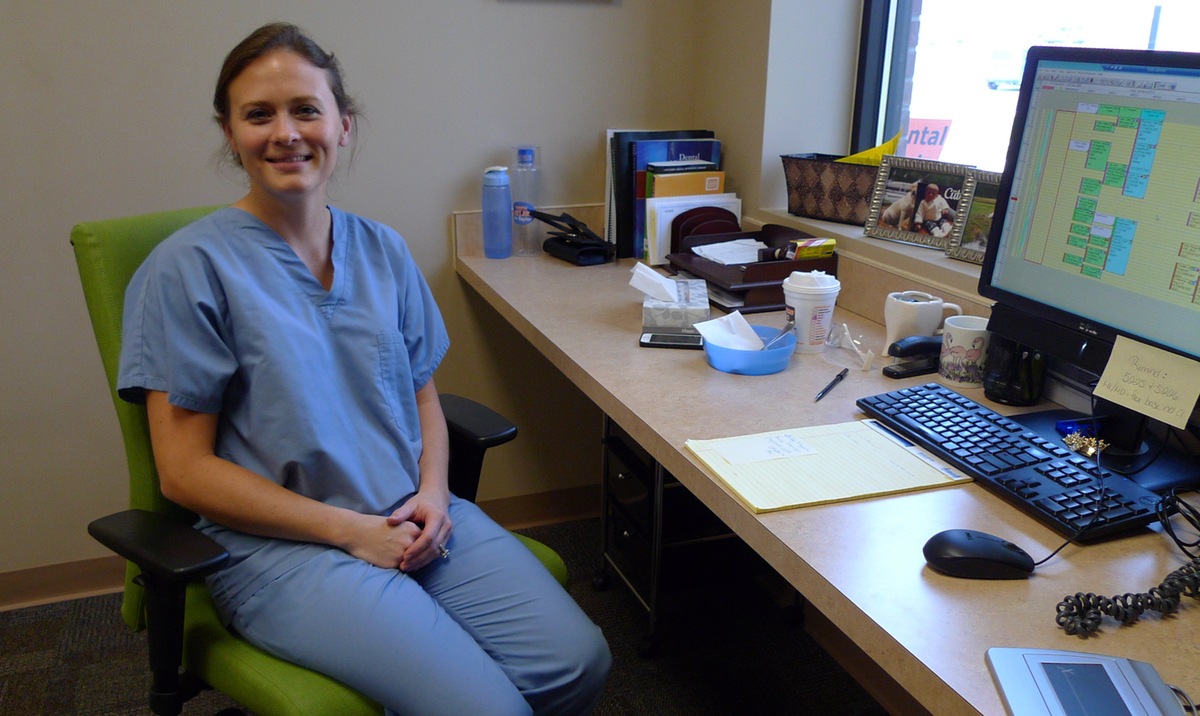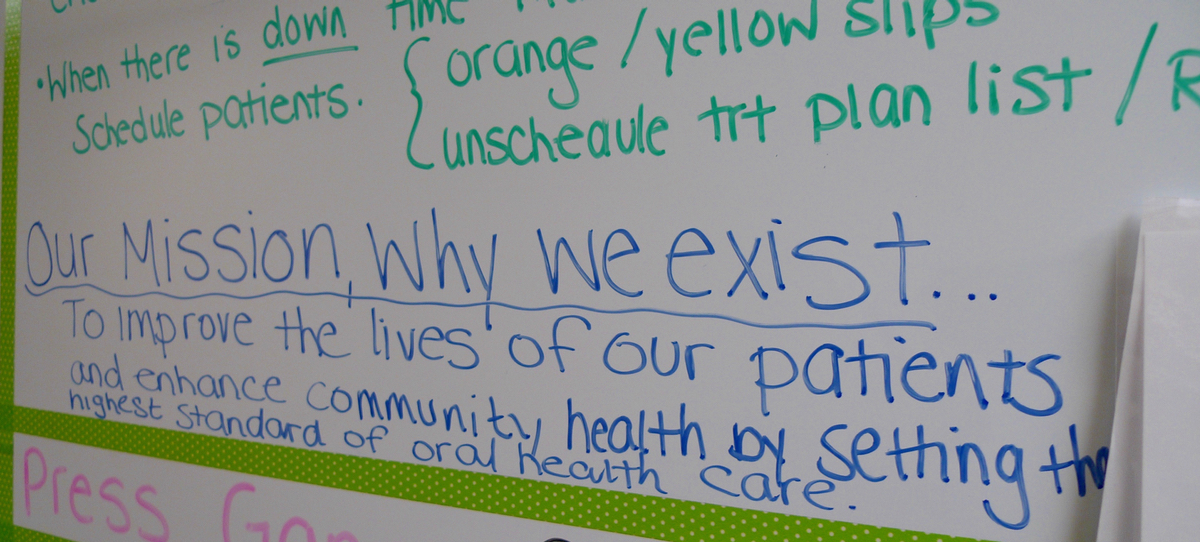Improved smiles for some low-income Michigan children
To the annals of great salesmanship, add Dr. Rebekah Sheppard, DDS, who is selling a filling to a 4-year-old as though it’s more fun than a trip to an amusement park.
The nasal device that delivers nitrous oxide is an “astronaut mask,” its product “happy air.” There’s a “slurpy straw” that will remove the water she playfully squirts from another hose at the tiny, sneakered patient in her chair, prompting a smile. A “bubble gum stick” carries the numbing agent onto her gums. The fillings are “silver stars.” And the whirring device whose sound alone can inspire dread in full-grown adults? A “tooth tickler.”
As Sheppard sets to work in her Monroe dental office, she keeps up a stream of patter. These are just surface cavities, nothing complicated, and she works fast. Her patient, whose mother watches from a chair in the corner, comes through it like a champ.
At the end, everyone is happy and relieved. This little girl and her mother leave with a non-traumatic memory of dental care and, most importantly, no bill.
The patient is a recipient of benefits through Healthy Kids Dental, a public/private partnership for Medicaid-eligible children that is making quality oral health care easier to get for Michigan’s low-income children. It’s a bright spot in an overall mixed picture of dental health in the state’s underserved rural areas.
Sheppard is the sole dentist (along with dental students, assistants and hygienists), in Michigan Community Dental Clinics’ Monroe County office, between Detroit and Toledo. MCDC is a chain of nonprofit facilities that work with local public health departments to provide care to low-income patients of all ages in 27 offices around the state.
Michigan’s Medicaid expansion under Obamacare, and programs like Healthy Kids Dental, have improved access for this population, said Dr. Gregory Heintschel, CEO of MCDC, based in Boyne City. He rates the state of the state’s dental care for the impoverished as mixed, with bright spots – access to care has increased – and darker ones; there are still too few practitioners in rural northern Michigan, especially the Upper Peninsula.
MORE COVERAGE: Effort to ban fluoride in drinking water makes little headway in Michigan
The improving Michigan economy, paradoxically, has made care in urban areas harder to find, Heintschel said. With job growth and lower unemployment more concentrated in cities, dentists there feel less need to accept Medicaid, which reimburses at anywhere from 30 to 75 percent of fee-for-service rates. Add another paradox: that it’s easier and cheaper to extract a tooth than to do root-canal work to save it, and the deck can be even more stacked against poorer people receiving quality, preventative dental care.
Quality dental treatment is critical because, as dentists and doctors ranging from the National Institutes of Health to the Mayo Clinic will tell you, the mouth is not only a portal to the body, it’s where larger health problems begin. Bacteria can travel from diseased gums to the pericardium, the sac that surrounds the heart, as well as to the body’s joints, aggravating arthritis. Gum disease is also linked to diabetes, low birth weight and atherosclerosis, and arterial plaque.
“If you have (joint-replacement) surgery scheduled, doctors will tell you to get your teeth cleaned first,” said Dr. Michael Campeau, who practices in Fremont, northeast of Muskegon. Bacteria from the mouth can infect newly implanted appliances.
Research has also found that children with dental pain generally do worse in school, according to multiple studies.
Campeau grew up in Hemlock, a small town near Saginaw, attended dental school at the University of Michigan and always intended to return to a small-town environment. His practice sees a mix of socioeconomic levels, but “quite a bit of poverty.” And as in the rest of their health care, he said, the latter population faces specific challenges the more well-off don’t – unreliable transportation, poor diets, jobs that don’t allow for time off, a lack of health literacy and a certain fatalism born of poverty.
“They say, ‘Well, my grandma had dentures, and so did my mom, so I guess I will, too,’” Campeau said. He tries to persuade them that preventative care will enable them to grow old along with their teeth, but attitudes are hard to change.
Start early, teach often
That’s one reason Healthy Kids Dental was so welcome, Heintschel said. Getting children into a “dental home” as soon as baby teeth erupt is the first step toward healthier mouths and better overall health. Parents who know that children should eat nutritious meals and limit sugary drinks and snacks are less likely to have tooth decay, diabetes, obesity and other chronic conditions.
Today, nearly 810,000 Michigan children are eligible for care under the program, most of them through age 21. Service reimbursement provides financial incentives to give preventative care, so as long as these young people find their dental home, the picture for their overall oral health is brighter.
Michigan is generally on a par with the rest of the country in its oral health, according to state reports. A 2013 summary indicates about a third of low-income children and adolescents in the state had received preventative care in the past 12 months, below the target of 57 percent but well above the national figure of 20 percent.
But for adults, Medicaid dentistry has suffered; dental Medicaid was reduced by the state in 2003 to emergency extractions only before being reinstated in 2005 and cut again in 2009, followed by restoration in 2010. This year, 215,124 adults have received dental services through Medicaid through mid-October, according to the Michigan Department of Health and Human Services.
“You raise your kids the same way you were raised,” Heintschel said, outlining a “very common” sight in MCDC offices: “Young mothers who bring in babies with bottles of Mountain Dew” in their child’s hands. Not only are soft drinks devoid of nutritional value, they’re highly corrosive to teeth, but “if that’s the only thing you have in the fridge, that’s what goes in a baby’s bottle,” Heintschel said. “And the Bridge card allows for soda (to be bought with EBT, commonly known as food stamps, benefits).”
In Monroe, Sheppard sees children with decay caused by poor choices like these, and she tries to educate when and where she can. Bottles and sippy cups should be discontinued as soon as possible, she tells parents; they concentrate liquid, frequently something sugary like juice, on a child’s front teeth, encouraging cavities.
It’s a message that parents are often surprised to hear, because giving older toddlers bottles ‒ even in their beds as a comfort object ‒ is common in many families. (Today, dentists recommend that both be discontinued as soon as a child is able to handle a standard cup, around the age of one.) The evidence can be seen in the X-rays of cavity-filled baby teeth that appear on her computer screen.
Education is a key element of dentistry, particularly at the public-health level.
Sheppard estimates that five to 10 times a week she hears persistent myths about dental care, including that pregnancy ruins a mother’s teeth, or that some other calamity triggered a cascade of tooth decay. In truth, she said, “it’s about diet and oral hygiene,” and tells her patients that if they get into the habit of taking care of their mouths, they’ll be rewarded in turn.
And if they don’t, there can be hell to pay down the road. The same day Sheppard gave a child a silver star, she also extracted the last of the natural teeth of a former homeless woman, in preparation for dentures ‒ and a badly needed hip replacement. This and other surgeries are easily complicated by gum disease, and this woman, at 71, hadn’t seen a dentist in her life until she started coming to the Monroe clinic. After a lifetime of neglect, her teeth were well beyond repair.
An ounce of prevention
Healthy Kids Dental was conceived, and is run, by Delta Dental, a nonprofit private insurer and one of the largest in the nation. Jed Jacobson, Delta’s senior vice president and chief science officer, said the company asked for a Medicaid carve-out in 2000, to improve service and access to care in Michigan and several other states.
Before then, “the Medicaid program was fee-for-service, and dentists were reimbursed at a terrible rate, around 25 cents on the dollar,” Jacobson said. “The overhead in a dentist office is around 75 percent. They couldn’t cover costs, and participation was very low. The administrative burden was high, too. Submitting claims was a hassle. And compliance was low ‒ there were a lot of no-show patients.”
With so many obstacles to quality care, Delta pitched a pilot program to the federal government to run in 22 rural counties that would increase reimbursement to dentists and turn the administrative end over to Delta. Everything improved; more dentists signed up, which helped patient compliance, because rural patients, who in the past had an average drive of 25 miles to a Medicaid dentist, were able to find one within 11 miles, on average, Jacobson said.
But it took 15 years to gradually expand the program, and low-income urban areas were the last to be added, with Kent (Grand Rapids), Oakland (Pontiac) and Wayne (Detroit) counties coming online just this month, after the legislature appropriated $12.7 million for the final piece. Now, nearly 80 percent of dentists in the state accept Healthy Kids Dental insurance, up from levels Jacobson estimates as around 30 percent.
For adults, the picture isn’t as rosy. The closing of another federally qualified health center in the U.P. has brought a flood of adult patients into the MCDC’s three U.P. offices. And low-income adults are “dentally and orally, the sickest of the sick,” the MCDC’s Heintschel said.
The disconnect between pediatric and adult services is unfortunate, he said, because health care in general, and especially in dentistry, “needs to be a family affair. If parents are not on board, then we’re constantly fighting the battle. There’s such a disparity between what Medicaid pays for kids and adults. If the parent isn’t receiving the message, even well-intentioned policy decisions can go wrong.”
Campeau, in his solo private practice, agrees.
“Early access to care, regular cleaning, simple restorative work will keep people out of the (emergency room),” he said. “When I first started practicing, there was a cut in adult Medicaid coverage for dental work. The hospital saw a pretty large increase of people coming in with abscesses and toothaches.
“If I can have the whole family in my practice, kids are more likely to come.”
Back in Monroe, a 3-year-old boy is squirming through one of Sheppard’s fillings, a less-willing patient than the girl earlier in the morning. His father comforts him, holding and immobilizing his hands as his son gets his own silver star and the boy’s mother watches with concern. But the procedure is over quickly, and he climbs down to collect his toy from a vending machine, twisting his numb lips.
His mother is relieved.
“When you think ‘health-department dental,’ you think everything is going to be white, metal, not very nice,” she said, gathering her things to leave. “But this is. It makes you feel much better about everything.”
See what new members are saying about why they donated to Bridge Michigan:
- “In order for this information to be accurate and unbiased it must be underwritten by its readers, not by special interests.” - Larry S.
- “Not many other media sources report on the topics Bridge does.” - Susan B.
- “Your journalism is outstanding and rare these days.” - Mark S.
If you want to ensure the future of nonpartisan, nonprofit Michigan journalism, please become a member today. You, too, will be asked why you donated and maybe we'll feature your quote next time!


 An MCDC clinic sees patients of all ages. Here, Dr. Rebekah Sheppard and assistant Bobby Laurence fill a cavity in a 4-year-old patient in Monroe. (Bridge photo by Nancy Derringer)
An MCDC clinic sees patients of all ages. Here, Dr. Rebekah Sheppard and assistant Bobby Laurence fill a cavity in a 4-year-old patient in Monroe. (Bridge photo by Nancy Derringer) In appointments, equipment and decor, the Monroe office is indistinguishable from a private-practice dental clinic. (Bridge photo by Nancy Derringer)
In appointments, equipment and decor, the Monroe office is indistinguishable from a private-practice dental clinic. (Bridge photo by Nancy Derringer) Rebekah Sheppard practices, with help from hygienists, assistants and dental students, in the Michigan Community Dental Clinics Monroe office, which serves low-income patients. (Bridge photo by Nancy Derringer)
Rebekah Sheppard practices, with help from hygienists, assistants and dental students, in the Michigan Community Dental Clinics Monroe office, which serves low-income patients. (Bridge photo by Nancy Derringer) A break-room whiteboard reminds workers of the clinic’s mission. (Bridge photo by Nancy Derringer)
A break-room whiteboard reminds workers of the clinic’s mission. (Bridge photo by Nancy Derringer)